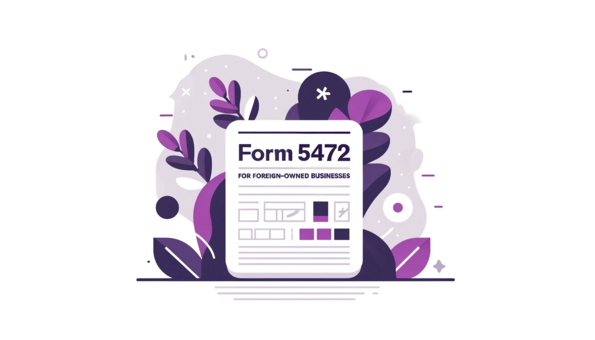Back
Small business tax planning tips
• 02.01.25
Guide to Form 8594 and purchase price allocation (PPA)
When buying or selling a business, understanding tax implications is critical. The Internal Revenue Service (IRS) Form 8594 is essential for reporting the allocation of purchase price – a process that can significantly affect the tax liabilities of both buyer and seller.
What is Form 8594?
Form 8594, "Asset Acquisition Statement Under...

• 19.08.24
1099-NEC vs. 1099-MISC: Understanding the key differences and when to use each
When it comes to filing taxes for non-employee compensation and miscellaneous income, businesses must be clear about which IRS forms to use.
The two most common forms – 1099-NEC and 1099-MISC – serve distinct purposes and have different reporting requirements.
Also read. 1099 Forms for LLCs: A comprehensive guide to compliance and best...
• 25.07.24
Understanding the differences between excise tax and sales tax
Taxation is a complex and integral part of any economy, influencing consumer behavior, business operations, and government policies.
Among the various types of taxes, excise tax and sales tax stand out due to their specific applications and impact.
This article aims to elucidate the differences between these two taxes, providing clarity on...
• 09.07.24
Maximizing financial efficiency: Understanding and managing tax overpayment
Tax overpayment occurs when individuals or businesses pay more taxes than they owe, often leading to refunds.
While receiving a refund might seem beneficial, overpaying taxes essentially grants the government an interest-free loan.
This article explores the concept of tax overpayment, its implications, and strategies to optimize tax...
• 04.07.24
Replacement tax in Illinois: guide for small businesses
Illinois is one of the few states that imposes tax on pass-through entities. If you own or operate an S corporation or partnership in Illinois, you must pay state replacement tax.
In this article, we will explain the replacement tax in Illinois, including its payment schedules, requirements for each business entity type, and special...

• 25.06.24
Maximizing small business tax credits: a comprehensive guide
As a small business owner, understanding the intricacies of tax credits can significantly impact your bottom line.
Small business tax credits offer a direct reduction of your tax bill, providing a dollar-for-dollar decrease in your tax liability.
This ultimate guide will help you navigate the most valuable tax credits available, ensuring...
• 07.05.24
Backup withholding: Understanding its purpose, process, and implications
Backup withholding is a precautionary tax measure enforced by the IRS (Internal Revenue Service) to ensure that taxes are collected on certain types of income.
This mechanism is crucial for income types where regular withholding is not typically enforced, such as interest, dividends, and independent contractor payments.
In this article,...
• 29.04.24
S corporation tax benefits: Balancing opportunities and challenges to be aware of
For small business owners contemplating the appropriate legal structure for their enterprise, the S corporation offers a blend of pass-through taxation and corporate liability protection.
This entity type, recognized under Subchapter S of the Internal Revenue Code, is designed to support small businesses by avoiding the double taxation...
• 23.04.24
Guide to Form 5472: filing requirements and instructions
Form 5472 is an important document for foreign companies doing business in the United States. This form helps ensure that these companies comply with US tax regulations regarding their related party transactions. The form is complex, and proper filing is essential to avoid significant penalties.
This guide provides a detailed walkthrough of...

• 22.03.24
Understanding the differences: Forms 1065 vs 1120S
Among the myriad of forms, Form 1065 and Form 1120S stand out for entities structured as partnerships and S corporations, respectively.
This article delves into the distinctions, requirements, and strategic considerations of each, offering a comprehensive guide for tax professionals and business owners alike.
What are Forms 1065 and...
• 22.03.24
Form 4797: Sales of Business Property [what it is and how to file it]
Understanding the intricacies of tax forms is crucial for business owners, accountants, and tax professionals.
Among these, Form 4797, "Sales of Business Property," stands out due to its specific use case and the detailed information it requires.
This article aims to demystify Form 4797, offering a comprehensive guide on what it is, when...
• 12.03.24
Form 7004 instructions: business tax extension
You might want to delay your business tax filing for many reasons. It could be due to your busy business season coinciding with tax season, or perhaps you're still gathering all the necessary documents for filing your return.
If this is the case, you can use Form 7004 to ask the IRS for a business tax extension. It will give you additional...

• 12.03.24
Augusta Rule: How does it work for small businesses?
If you've been wondering whether you can rent your home to your business, the Augusta Rule could be the answer. This tax strategy offers a dual benefit: it allows you to reduce your business taxes while earning some tax-free income as a homeowner. Although the Augusta tax rule was not created for business taxation, it still applies.
In this...

• 11.03.24
LLC vs. sole proprietorship: How to choose with a focus on taxes
Choosing the right business structure is a pivotal decision for entrepreneurs, impacting everything from daily operations to tax obligations.
In this article, we delve into the nuances of LLCs (Limited Liability Companies) versus sole proprietorships, with a special focus on tax considerations.
Understanding the tax implications of each...
• 11.03.24
Tax considerations when using an LLC for rental property
Navigating the complexities of tax laws can be challenging for rental property owners.
This article provides a comprehensive guide on how establishing an LLC for rental properties impacts tax considerations.
Our goal is to empower property investors with the knowledge to make informed decisions.
Understanding LLCs and rental...
• 08.03.24
Understanding IRS Form 6198: At-Risk Limitations
Form 6198, "At-Risk Limitations," is integral to the US tax system, particularly for investors and business owners.
It's designed to limit the loss that a taxpayer can claim from business activities, ensuring that these losses are only as much as the taxpayer's actual financial risk.
What triggers the need for Form 6198?
You'll need to...
• 30.05.22
What Is Tax Filing Status and How Does It Affect a Taxpayer’s Tax Return?
When it comes to taxes, there are a lot of things that people don't know or understand. One common thing is tax filing status. What is it and how does it affect your tax return? In this blog post, we'll go over what tax filing status is and how it can impact your return. We'll also give you some tips on how to choose the right filing status for...
• 23.05.22
Tax Refund: More People Qualify for Earned Income Tax Credit (EITC)
The IRS has announced an expansion of the Earned Income Tax Credit (EITC). Enacted in 1975, the EITC provides support to millions of low to moderate-income workers and families and is regarded as one of the federal government's largest antipoverty programs.
The amount a taxpayer receives depends on their income, filing status, and the number...

• 20.05.22
Refund and Other Reasons Why You Need to File a 2021 Tax Return
2021’s economic environment has been extraordinary for many U.S. taxpayers. 2021 has also been unusual in terms of new tax laws. These new rules may affect many taxpayers who wouldn’t ordinarily file a 2021 tax return. Income dollar limits alone can determine who must file a tax return. Why you need to file a 2021 tax return often turns on...
• 06.05.22
Difference Between Standard and Itemized Deductions
Did you know that you can reduce your tax bill either by taking itemized deductions or standard deductions? Wondering which one to choose? This article explains both of them in detail and highlights the difference between standard and itemized deductions. You will also find out what factors to consider when deciding whether to choose itemized or...
